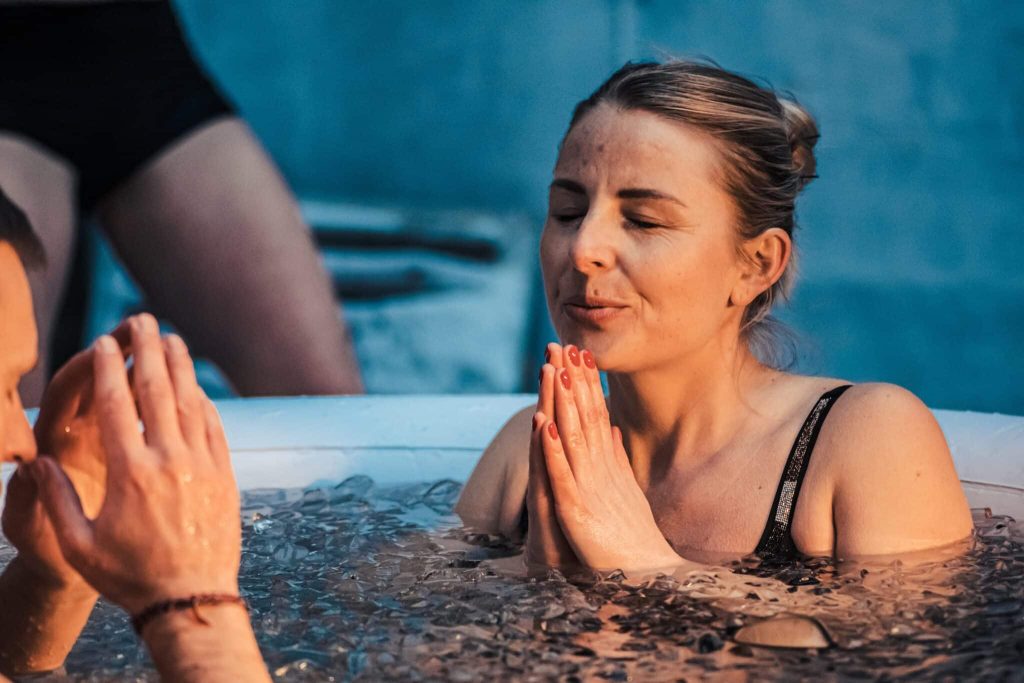

Scientists investigated the effects of cold plunges at a cellular level. (Michele Ursi/Shutterstock)
In a nutshell
- Your cells learn to adapt to cold stress fast. In just seven days of daily cold plunges, participants’ cells shifted from emergency mode (inflammation and cell death) to a more efficient system focused on protection and repair.
- Cold exposure boosts your body’s cellular housekeeping. The process of autophagy, where cells clean up and recycle damaged components, improved significantly over the week, suggesting cold plunges may support long-term cellular health.
- Feeling tougher in the cold isn’t just in your head. Even without big changes in core temperature, participants shivered less by the end of the week, and their immune cells were better at handling extreme cold, showing real, measurable improvements in cold tolerance.
OTTAWA, Canada — The old saying “what doesn’t kill you makes you stronger” might apply to your cells when it comes to cold exposure. Not only do you become more comfortable with repeated exposure to icy plunges, but researchers from the University of Ottawa have discovered an invisible adaptation happening simultaneously. Your cells literally rewire their protective responses, transforming from a state of emergency to efficient damage control in just seven days.
When you plunge into cold water, besides the gasp and goosebumps, your body engages in a chilly cellular battle. Your cells struggle as reactions slow down, membranes contract, and proteins become damaged. This microscopic chaos can ultimately lead to cell death if protective systems don’t kick in quickly enough.
That’s when the tremendous adaptation the body goes through begins to take place, and we experience benefits that actually help us survive and thrive. In fact, researchers suggest there could even be anti-aging advantages to cold exposure.
The Cold Water Challenge
The study, published in Advanced Biology, involved ten young men who submerged themselves in 14°C (57°F) water for an hour daily for one week. This temperature, cold enough to be challenging but not dangerous, created sufficient stress to trigger cellular responses without endangering participants.
Unlike previous cold-exposure research, the team measured cellular responses throughout the acclimation period and also conducted laboratory tests on blood samples before and after the program. This approach revealed how cells adapted over time and how those adaptations affected tolerance to extreme cold.


On day one, the participants’ cells seemed overwhelmed. Their autophagy mechanism, the cell’s recycling and garbage disposal system, wasn’t working properly. Meanwhile, inflammation markers increased alongside signals for programmed cell death, indicating cells were being sacrificed rather than saved.
By day four, early signs showed autophagy beginning to improve, though cell death signals remained high. The body was learning but hadn’t mastered the cold response yet.
The most dramatic shift appeared on day seven. By the end of the week, participants’ cells showed remarkably enhanced autophagy alongside reduced inflammation and cell death markers. In simple terms, their bodies had shifted from a “sacrifice the damaged” approach to a “repair and protect” strategy.
Cellular Housekeeping and Cold Tolerance
Autophagy works as your body’s internal recycling system. It removes damaged components and recycles materials, keeping cells healthy and functioning properly.


The research documented that cold exposure initially stressed this system, but with repeated exposure, the cellular cleanup mechanism improved substantially. This improvement might explain why the body adapts to cold beyond just reducing shivering or changing blood flow patterns.
Water conducts heat away from your body about 24 times more efficiently than air. This thermal conductivity creates more pronounced physiological responses than cold air, which helps explain the significant cellular changes observed in just one week.
These cellular improvements happened despite minimal changes in core body temperature throughout the week. Participants did shiver less by day seven, but the real action was occurring at the microscopic level inside cells.
‘Amazed How Quickly Body Adapted’
For practical applications, gradually exposing yourself to cold, whether through swimming, cold showers, or other methods, might trigger beneficial cellular adaptations. However, the researchers emphasize that their study used specific protocols with healthy young men, and caution should be used when applying cold exposure to different populations.
The research adds scientific backing to what cold plunge enthusiasts have experienced, that regular exposure transforms how your body responds to environmental stress. Beyond just feeling tougher in cold conditions, your cells develop enhanced protective mechanisms with potential benefits for overall health.
“We were amazed to see how quickly the body adapted,” says study author Kelli King from the University of Ottawa, in a statement. “Cold exposure might help prevent diseases and potentially even slow down aging at a cellular level. It’s like a tune-up for your body’s microscopic machinery.”
Our bodies can adapt to environmental stress in ways far more complex than we feel on the surface. A week of cold plunges doesn’t just teach you to brave the chill; it teaches your cells to clean house more efficiently, with potential benefits that extend well beyond your next polar plunge.
Paper Summary
Methodology
The University of Ottawa research team recruited ten habitually active young men (average age 23) for the study. Each participant underwent seven consecutive days of cold water immersion, sitting in 14°C water for up to 60 minutes daily. Core temperature was monitored using an esophageal probe positioned at heart level. Blood samples were collected before and after cold exposure on days 1, 4, and 7. The researchers isolated immune cells from these samples and analyzed various markers related to autophagy, inflammation, and cell death using Western blotting. They also conducted laboratory experiments exposing blood samples to different temperatures to assess cold tolerance before and after acclimation.
Results
Day 1: Cold exposure triggered autophagy dysfunction, with increased p62 (a marker that normally decreases during successful autophagy) and elevated cell death signals (cleaved-caspase-3) and inflammation markers (TNF-α).
Day 4: Early improvements in autophagy function appeared, though cell death signals remained elevated.
Day 7: Significant improvements emerged with increased LC3-II (a key autophagy marker), decreased p62, and normalization of cell death and inflammation signals.
Laboratory experiments showed that cells collected after acclimation better withstood extreme cold exposure, with enhanced autophagy activation and reduced cell death signals compared to pre-acclimation samples.
Limitations
The study included only young, healthy men, limiting its applicability to other populations. Researchers examined only blood cells, which may respond differently than other tissue types. The one-week acclimation period, while sufficient to show changes, may not represent the full extent of possible adaptations. Additionally, the findings apply specifically to cold water immersion and may not translate exactly to cold air exposure, which creates different physiological responses.
Discussion and Takeaways
The research demonstrates a cellular basis for cold acclimation, showing that repeated cold exposure shifts cellular responses from damage and death to protection and repair. The enhanced autophagy function observed might have implications beyond cold tolerance, as autophagy plays a crucial role in cellular health, aging processes, and disease prevention. This suggests potential applications for structured cold exposure protocols as non-pharmaceutical interventions to boost cellular health, though more research across diverse populations is needed.
Funding and Disclosures
This research received funding from the National Sciences and Engineering Research Council (NSERC) Research Grant. The authors declared no conflicts of interest. Kelli E. King and James J. McCormick received support from MITACs Accelerate and the Human and Environmental Physiology Research Unit at the University of Ottawa.
Publication Information
The paper, “The Effect of 7-Day Cold Water Acclimation on Autophagic and Apoptotic Responses in Young Males,” was authored by Kelli E. King, James J. McCormick, and Glen P. Kenny. It appeared in Advanced Biology in 2025 (Volume 9, Issue 2400111). The research was conducted at the Human and Environmental Physiology Research Unit, School of Human Kinetics, University of Ottawa, and the Clinical Epidemiology Program, Ottawa Hospital Research Institute.








